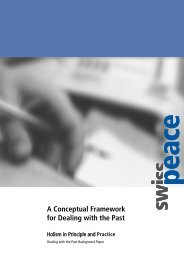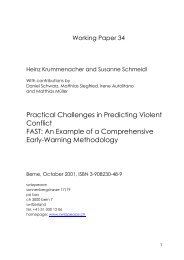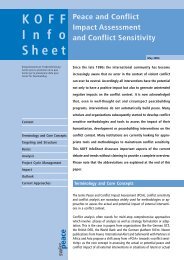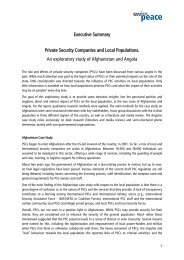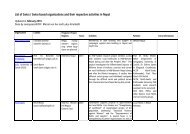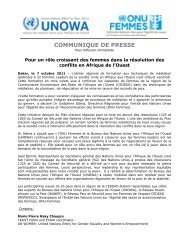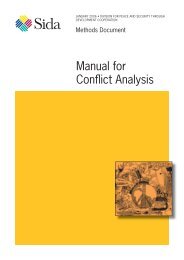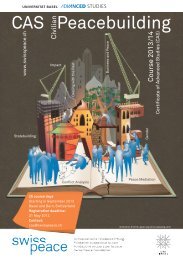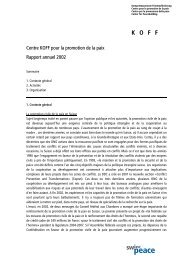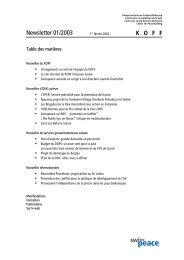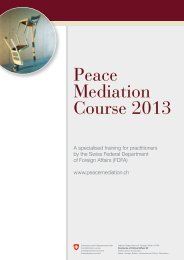Unpacking the Mystery of Mediation in African Peace ... - Swisspeace
Unpacking the Mystery of Mediation in African Peace ... - Swisspeace
Unpacking the Mystery of Mediation in African Peace ... - Swisspeace
Create successful ePaper yourself
Turn your PDF publications into a flip-book with our unique Google optimized e-Paper software.
North-Mali and North-Niger, Libya Engagement<br />
Background <strong>of</strong> <strong>the</strong> Conflict<br />
Chronology<br />
The Tuareg, who are part <strong>of</strong> <strong>the</strong> Berber people,<br />
are a nomadic pastoralist ethnic group resid<strong>in</strong>g <strong>in</strong><br />
several West <strong>African</strong> countries: Algeria, Burk<strong>in</strong>a<br />
Faso, Libya, Mali, and Niger. 139 In <strong>the</strong> 1990s,<br />
Tuaregs <strong>in</strong> Mali and Niger claimed autonomy for<br />
<strong>the</strong>ir traditional homeland, and voiced concern<br />
over <strong>the</strong> exploitation <strong>of</strong> <strong>the</strong>ir region by government-backed<br />
foreign companies. 140 Deadly<br />
clashes between Tuareg fighters and <strong>the</strong> armies <strong>of</strong><br />
both countries followed, result<strong>in</strong>g <strong>in</strong> thousands <strong>of</strong><br />
deaths. Negotiations <strong>in</strong>itiated by France and Algeria<br />
led to peace agreements <strong>in</strong> 1995 and 1998<br />
<strong>in</strong> both countries.<br />
In 2006, Tuareg rebel groups rose up aga<strong>in</strong> to<br />
press for <strong>in</strong>clusion <strong>in</strong> <strong>the</strong> political process and <strong>in</strong><br />
<strong>the</strong> economic development <strong>of</strong> <strong>the</strong>ir desert region.<br />
In July 2006, Algerian mediation efforts led to an<br />
agreement between <strong>the</strong> government <strong>of</strong> Mali and<br />
<strong>the</strong> rebel group Democratic Alliance for Change<br />
(DAC). One faction, led by Ibrahim Ag Bahanga,<br />
refused to sign <strong>the</strong> deal, say<strong>in</strong>g it did not do<br />
enough to help <strong>the</strong> Tuaregs. 141 He announced<br />
that his movement had formed an alliance with<br />
Niger’s Tuareg rebels, called <strong>the</strong> Alliance Tuareg<br />
Nord-Mali pour le Changement (ATNMC).<br />
However, <strong>the</strong> Tuareg Movement <strong>in</strong> Niger (Mouvement<br />
des Nigeriens pour la Justice, MNJ) denied<br />
<strong>the</strong> existence <strong>of</strong> such an alliance.<br />
S<strong>in</strong>ce 2007, <strong>the</strong> fight<strong>in</strong>g has led to hundreds <strong>of</strong><br />
deaths and hostage-tak<strong>in</strong>g. Mali’s President<br />
Amadou Toumani Touré and Niger’s President<br />
Mamadou Tandja have described <strong>the</strong> rebels as<br />
‘bandits’, ‘terrorists’, and ‘arms smugglers’ that<br />
use Mali as a base to attack Niger and vice<br />
139 Before French colonization, <strong>the</strong> Tuareg were organized <strong>in</strong>to<br />
loose confederations, each consist<strong>in</strong>g <strong>of</strong> a dozen <strong>of</strong> tribes. Each<br />
<strong>of</strong> <strong>the</strong> ma<strong>in</strong> groups had a traditional leader along with an assembly<br />
<strong>of</strong> tribal chiefs. Dur<strong>in</strong>g <strong>the</strong> colonial era, <strong>the</strong>ir confederations<br />
were largely dismantled and reorganized.<br />
140 Nei<strong>the</strong>r Mali nor Niger is ethnically polarized at <strong>the</strong> national<br />
level, and <strong>the</strong> Tuareg population <strong>in</strong> both states is about ten per<br />
cent. However, <strong>the</strong> group is regionally concentrated, and <strong>in</strong><br />
those units <strong>the</strong> predom<strong>in</strong>ant ethnic group.<br />
141 It is unclear just how much popular support Bahanga has, but<br />
he is believed by many Malians to be us<strong>in</strong>g <strong>the</strong> cover <strong>of</strong> a rebellion<br />
for his own enrichment. His group is also responsible for<br />
lay<strong>in</strong>g land m<strong>in</strong>es on public roads, which have killed dozens <strong>of</strong><br />
people <strong>in</strong> <strong>the</strong> first half <strong>of</strong> 2008.<br />
versa. 142 While Tandja has vowed to fight ra<strong>the</strong>r<br />
than negotiate with <strong>the</strong> rebels and declared a state<br />
<strong>of</strong> alert <strong>in</strong> <strong>the</strong> region, giv<strong>in</strong>g extra powers to <strong>the</strong><br />
military, 143 Touré appears to be ambivalent between<br />
a civil or military response.<br />
Causes <strong>of</strong> Conflict<br />
The conflict is an example <strong>of</strong> a transnational ethnic<br />
group <strong>in</strong>volved <strong>in</strong> conflict <strong>in</strong> more than one<br />
state. It is an <strong>in</strong>ter- and <strong>in</strong>tratribal conflict due to<br />
tensions between governments, modern agricultural<br />
schemes, and marg<strong>in</strong>alized parts <strong>of</strong> <strong>the</strong><br />
population. The Tuaregs’ grievances range from<br />
demands for <strong>the</strong>ir political <strong>in</strong>tegration to political<br />
accountability on <strong>the</strong> part <strong>of</strong> <strong>the</strong> rul<strong>in</strong>g elite. For<br />
many decades, <strong>the</strong> North <strong>of</strong> Mali has felt excluded<br />
from <strong>the</strong> national development agenda. In<br />
addition, <strong>the</strong> uneven distribution <strong>of</strong> <strong>the</strong> wealth<br />
generated by <strong>the</strong> exploitation <strong>of</strong> Mali’s and Niger’s<br />
natural resources – uranium, 144 gold, and<br />
oil145 – has exacerbated <strong>the</strong> abject poverty <strong>in</strong><br />
which <strong>the</strong> majority <strong>of</strong> <strong>the</strong> region’s people f<strong>in</strong>d<br />
<strong>the</strong>mselves.<br />
In Niger, <strong>the</strong> process <strong>of</strong> adm<strong>in</strong>istrative decentralization,<br />
improved development <strong>in</strong> <strong>the</strong> north, and<br />
disarmament that was promised <strong>in</strong> <strong>the</strong> 1995<br />
Ouagadougou Agreement has been <strong>in</strong>complete.<br />
In Mali, <strong>the</strong> spill-over effect <strong>of</strong> Niger’s unconta<strong>in</strong>ed<br />
crisis is evident, as is <strong>the</strong> dissatisfaction<br />
among a small part <strong>of</strong> <strong>the</strong> Tuareg community<br />
over <strong>the</strong> 2006 agreement. Regional governments<br />
and analysts are divided, however, over <strong>the</strong> extent<br />
to which <strong>the</strong> Tuareg rebels are driven by genu<strong>in</strong>e<br />
political grievances or whe<strong>the</strong>r <strong>the</strong>y are fight<strong>in</strong>g<br />
to control lucrative arms, drugs, and migrant<br />
142 Reuters AlertNet: “Rebellion <strong>in</strong> uranium region” (3 September<br />
2007), (http://www.alertnet.org).<br />
143 The attempts <strong>of</strong> Niger’s government to silence media coverage<br />
on <strong>the</strong> issue and <strong>the</strong> 4,000 government troops sent to <strong>the</strong> north<br />
have failed to stop <strong>the</strong> MNJ’s approximately 1,000 troops. Instead,<br />
defections from government forces have re<strong>in</strong>forced <strong>the</strong><br />
rebellion, creat<strong>in</strong>g a quasi-permanent state <strong>of</strong> <strong>in</strong>security <strong>in</strong> <strong>the</strong><br />
north.<br />
144 Niger hopes to become <strong>the</strong> world’s second-biggest uranium<br />
producer by 2011 through <strong>the</strong> development <strong>of</strong> more m<strong>in</strong>es <strong>in</strong><br />
<strong>the</strong> nor<strong>the</strong>rn region. The uranium sector was long dom<strong>in</strong>ated<br />
by former colonial power France, but Niger is now open<strong>in</strong>g up<br />
its m<strong>in</strong><strong>in</strong>g areas <strong>in</strong> <strong>the</strong> north to companies from Canada,<br />
Ch<strong>in</strong>a, Japan, and <strong>the</strong> US, despite grave security problems.<br />
145 A number <strong>of</strong> Canadian, Ch<strong>in</strong>ese, Venezuelan, and Australian<br />
oil companies and energy firms have signed lucrative deals with<br />
Mali concern<strong>in</strong>g oil exploration <strong>in</strong> <strong>the</strong> nor<strong>the</strong>rn region.<br />
55




